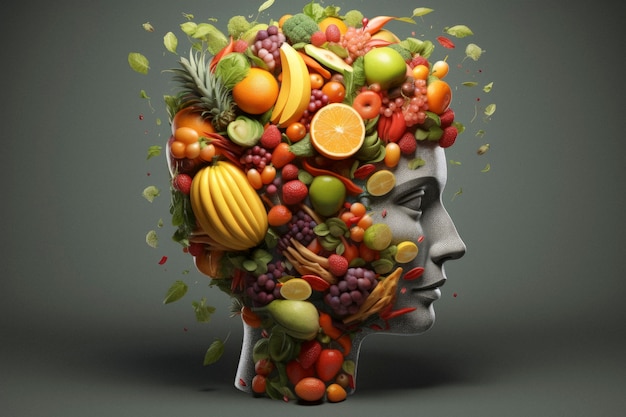By Ogbu Gabriel Okpale 27th September, 2024.

Nutrition is a vital element in human development, and its influence on education cannot be overstated. From early childhood to adolescence and beyond, the food we consume has a profound impact on our ability to learn, focus, and perform at our best. In schools and educational settings, proper nutrition is not just about ensuring children are healthy—it is about empowering students to excel academically, develop critical thinking skills, and ultimately, build the foundation for a successful future.
In this article, we will explore how nutrition affects learning, cognitive function, and the overall academic performance of students. We will delve into the key nutrients necessary for optimal brain development, the negative impact of malnutrition on education, and the steps schools and communities can take to promote better nutrition for students.
- Nutrition and Cognitive Function: Fuel for the Brain

The brain is one of the most energy-demanding organs in the body, and it requires a constant supply of nutrients to function properly. For students in any educational setting, the quality of their nutrition directly affects how well they can focus, process information, and retain knowledge. Inadequate nutrition can hinder cognitive development, leading to difficulties in concentration, problem-solving, and memory retention.
Key Nutrients for Cognitive Development:
– Omega-3 Fatty Acids: These essential fats, found in fish, flaxseeds, and walnuts, play a critical role in brain development and function. Omega-3s improve memory, enhance cognitive flexibility, and support overall brain health—key components of effective learning.
– Iron: Iron is vital for the transport of oxygen in the blood, and iron deficiency can impair cognitive abilities, leading to fatigue, poor concentration, and difficulty retaining information. This is especially important for young students, as iron deficiency is common during periods of rapid growth.
– Glucose: Glucose, derived from carbohydrates, is the brain’s primary source of energy. Stable blood sugar levels are essential for maintaining focus and energy throughout the school day. Low blood sugar can cause fatigue, irritability, and a decline in cognitive performance, particularly in children.
- The Physical and Mental Impact of Malnutrition on Students

Malnutrition—whether from a lack of food or an imbalanced diet—can have severe and lasting effects on a student’s ability to learn. Undernourished students often experience physical weakness, fatigue, and frequent illness, which can lead to absenteeism and a reduced capacity to participate in classroom activities. Beyond physical health, malnutrition also impacts mental health, which is closely tied to academic performance.
Consequences of Malnutrition:
– Stunted Growth and Cognitive Delay: Chronic malnutrition in early childhood can lead to stunted growth and delayed cognitive development, resulting in long-term learning difficulties.
– Increased Absenteeism: Students who suffer from malnutrition are more likely to miss school due to illness or fatigue, which negatively impacts their academic performance.
– Mental Health Challenges: Malnutrition is linked to higher rates of anxiety, depression, and behavioral issues. These mental health challenges can further hinder a student’s ability to concentrate, engage in learning, and perform well in school.
3. How Poor Nutrition Affects Academic Performance
The impact of poor nutrition on academic performance is well-documented. A student who comes to school hungry or with an unbalanced diet is likely to struggle with paying attention in class, completing assignments, and performing well on exams. Poor nutrition can lead to a vicious cycle of underachievement, where struggling students fall further behind, lose motivation, and disengage from their education.
Common Issues Linked to Poor Nutrition:
– Difficulty Concentrating: Students who are not properly nourished often find it difficult to concentrate for extended periods, making it harder to absorb new information.
– Low Energy Levels: Without adequate nutrition, students lack the energy needed to participate fully in physical and academic activities, leading to fatigue and disengagement.
– Mood Swings and Behavioral Problems: Unstable blood sugar levels due to poor nutrition can cause irritability, mood swings, and disruptive behavior, all of which negatively affect learning and classroom dynamics.
4. The Connection Between Nutrition and Mental Health
Mental health plays a crucial role in educational success, and nutrition is directly linked to mental well-being. A well-nourished student is more likely to have stable moods, higher self-esteem, and better social skills. On the other hand, students who experience poor nutrition may suffer from anxiety, depression, or chronic stress, which can interfere with their ability to learn and perform academically.
Nutrients that Support Mental Health:
– B Vitamins: Found in foods like eggs, whole grains, and leafy greens, B vitamins are essential for brain function and mental health. They help regulate energy levels and improve mood, which are crucial for staying focused in school.
– Magnesium: Known for its calming effects, magnesium helps reduce anxiety and improve sleep quality—both of which are important for a student’s ability to function well in the classroom.
– Tryptophan: This amino acid, found in turkey, dairy products, and nuts, is a precursor to serotonin, a neurotransmitter that helps regulate mood and promote feelings of well-being. A balanced mood enhances a student’s capacity to engage in learning without feeling overwhelmed or stressed.
5. Practical Steps Schools and Communities Can Take to Improve Nutrition

Recognizing the vital role that nutrition plays in education, schools and communities have the power to promote healthier eating habits and ensure that all students have access to nutritious food. These efforts can significantly improve students’ academic performance, physical health, and mental well-being.
Strategies to Promote Better Nutrition:
– School Meal Programs: Providing students with access to healthy meals at school—whether through breakfast programs, lunch initiatives, or snack breaks—can help ensure that students are well-nourished and ready to learn. These programs are especially critical in low-income areas where students may not have access to healthy food at home.
– Nutrition Education: Teaching students about the importance of a balanced diet and how to make healthy food choices empowers them to take charge of their own nutrition. This knowledge can lead to lifelong healthy eating habits, benefiting both their academic performance and overall health.
– Community Involvement: Schools can partner with local organizations, businesses, and farms to provide fresh, healthy food to students. This not only supports the nutritional needs of students but also strengthens community ties and promotes local agriculture.

Conclusion
Nutrition is a cornerstone of educational success. Without adequate nutrition, students are at a significant disadvantage, both physically and mentally. By ensuring that students have access to healthy, balanced diets, we can enhance their cognitive abilities, improve their physical health, and foster a more positive and productive learning environment.
Schools and communities must prioritize nutrition as a fundamental aspect of education. By doing so, we not only support students’ academic achievements but also equip them with the tools they need for long-term success in life. Proper nutrition fuels the mind, empowers learning, and creates a brighter, healthier future for all students.
FAQs on Nutrition in Education
1. How does nutrition affect academic performance?
2. What are the essential nutrients for cognitive development?
3. Can poor nutrition lead to behavioral issues in students?
4. What role does breakfast play in a student’s learning?
5. How can schools promote better nutrition among students?
6. What are the signs of malnutrition in children?
7. How does hydration impact concentration and learning?
8. Are there specific diets that enhance learning?
9. What can parents do to improve their children’s nutrition?
10. How does nutrition influence mental health in students?
